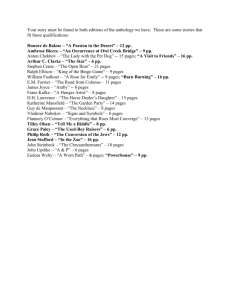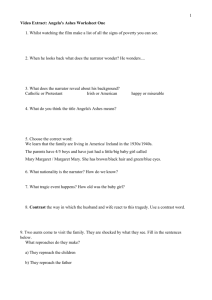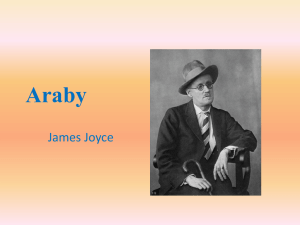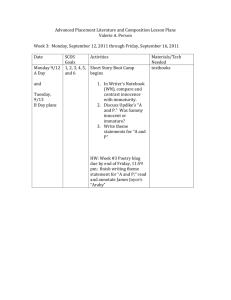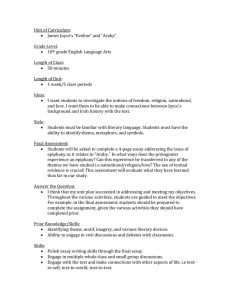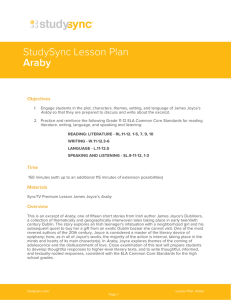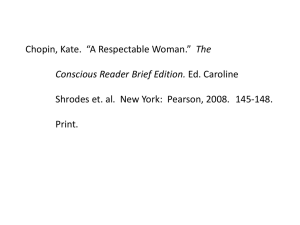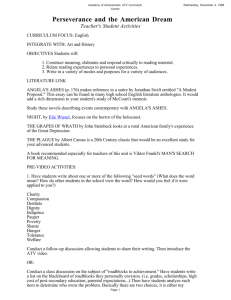“Araby” - TeacherWeb
advertisement
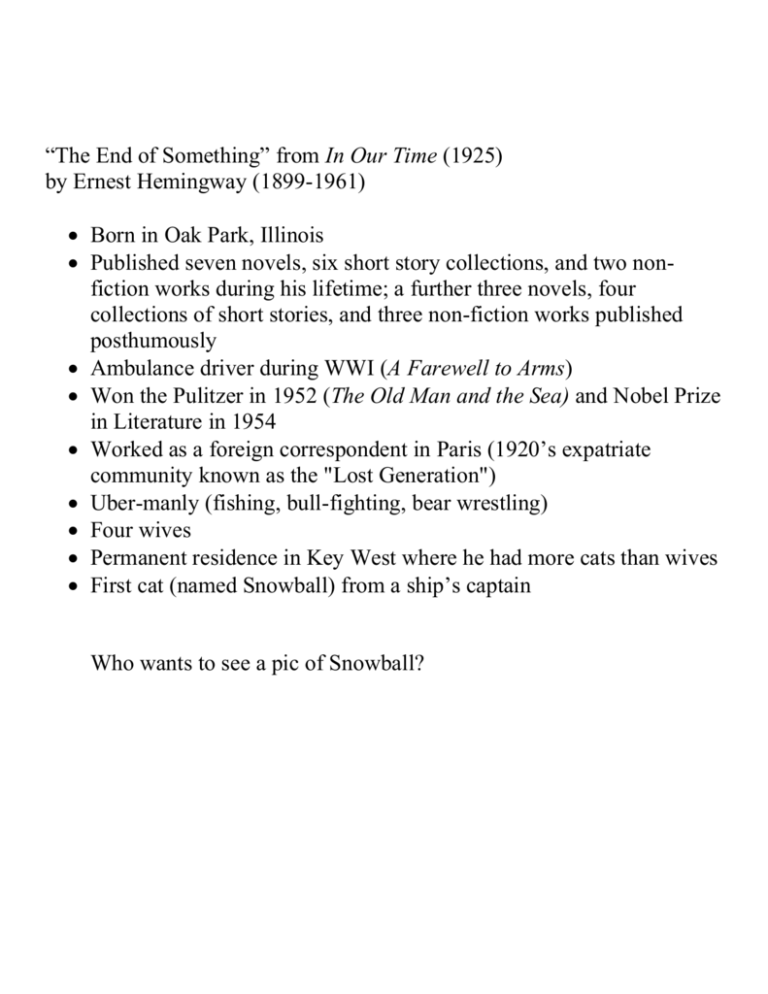
“The End of Something” from In Our Time (1925) by Ernest Hemingway (1899-1961) Born in Oak Park, Illinois Published seven novels, six short story collections, and two nonfiction works during his lifetime; a further three novels, four collections of short stories, and three non-fiction works published posthumously Ambulance driver during WWI (A Farewell to Arms) Won the Pulitzer in 1952 (The Old Man and the Sea) and Nobel Prize in Literature in 1954 Worked as a foreign correspondent in Paris (1920’s expatriate community known as the "Lost Generation") Uber-manly (fishing, bull-fighting, bear wrestling) Four wives Permanent residence in Key West where he had more cats than wives First cat (named Snowball) from a ship’s captain Who wants to see a pic of Snowball? Three Short Stories: The Epiphany and Self-Discovery “Araby,” “A & P,” “Angela’s Ashes” Prewriting Exercise for “Araby,” by James Joyce (1914) Response #1 – Free-write: Describe your first childhood crush. How old were you? What were the circumstances? Explain what it felt like when you were with the person, and when you were apart. What were your hopes, desires, and frustrations? Looking back on this crush, how do you feel about it now? Response #2 -- Discuss: Can reality ever live up to a person’s dreams? Which is better, the anticipation or the event itself? Relate an experience that supports your opinion. “Araby,” by James Joyce (1882-1941) Born in Dublin, Ireland, in 1882. Died, 1941. He grew up in poverty; educated in Jesuit schools. Many of his stories are set in Ireland and show the strong effect both poverty and religion had on his life. His collection of short stories, Dubliners, is semi-autobiographical. “Araby” comes from that collection. His writing influenced the next writers we will be studying: John Updike and Frank McCourt. Epiphany = a sudden insight or understanding into the meaning of something (spiritual, personal, etc.) The epiphany is usually brought on by a seemingly trivial, everyday event. “A & P,” by John Updike (1932-2009) Born in Reading, PA in 1932. Died January 2009 Received his education at Harvard and Oxford Universities Originally he aspired to be a cartoonist (random fact) He published hundreds of stories, poems, etc. in The New Yorker. James Joyce was a major influence for Updike; “A & P” is a modern, American retelling of “Araby.” His stories are all centered on the American small-town, Protestant middle-class. His main characters frequently experience personal turmoil and must respond to crises relating to religion, family obligations, and marital infidelity. Like “Araby,” “A & P” ends with a moment of epiphany. Angela’s Ashes by Frank McCourt (1930-2009) Born in Brooklyn, New York in 1930. He passed away in July 2009 (getting warmer!). As a result of the Great Depression, McCourt’s family moved from NY to Limerick, Ireland in 1934, hoping for a better life. In Limerick, his family sank even deeper into poverty. He stopped going to school at 13 and worked instead to earn money for food and lodging. At 19 he moved back to the U.S. where he ultimately became a NY City high school teacher for 30 years. He published his first book Angela’s Ashes in 1996, when he was 66 years old! It took the literary world by storm and it was awarded the Pulitzer Prize for fiction. McCourt was also VERY heavily influenced by James Joyce. Like “Araby,” Angela’s Ashes traces the overwhelming influence of poverty and religion on the people of Ireland. - Memoir vs. autobiography Style/tone/voice Attitude towards religion Northern Ireland (history?) When I look back on my childhood I wonder how I survived it at all. It was, of course, a miserable childhood: the happy childhood is hardly worth your while. Worse than the ordinary miserable childhood is the miserable Irish childhood, and worse yet is the miserable Irish Catholic childhood. People everywhere brag and whimper about the woes of their early years, but nothing can compare with the Irish version: the poverty; the shiftless loquacious alcoholic father; the pious defeated mother moaning by the fire; pompous priests; bullying schoolmasters; the English and the terrible things they did to us for eight hundred long years.
